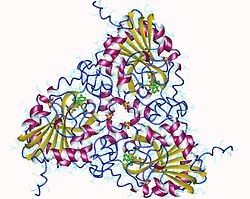Purine nucleoside phosphorylase
| Purine nucleoside phosphorylase | ||
|---|---|---|

|
||
|
Existing structural data: s. UniProt |
||
| Properties of human protein | ||
| Mass / length primary structure | 289 amino acids | |
| Secondary to quaternary structure | Homotrimer | |
| Identifier | ||
| Gene name | NP | |
| External IDs | ||
| Enzyme classification | ||
| EC, category | 2.4.2.1 , glycosyl transferase | |
| Response type | Transfer of a ribose group | |
| Substrate | Purine ribonucleoside + phosphate | |
| Products | Purine + α-D-ribose-1-phosphate | |
| Occurrence | ||
| Parent taxon | Creature | |
| Exceptions | plants | |
Purine nucleoside phosphorylase (PNP) (Gen: NP ) is the enzyme that removes the ribose from ribo- and deoxyribo- purine nucleosides . It is indispensable for the breakdown of these basic building blocks of genetic information in all living things (however, nothing is known about the corresponding enzymes in plants). The PNP is localized in the cytosol . Mutations of the NP gene in humans may hereditary PNP deficiency cause of in childhood with severe T cells - immune deficiency associated.
The active form of human PNP is a trimer with a molar mass of about 100 KDa. PNP is responsible for the breakdown of deoxyribonucleosides ( deoxyguanosine to guanine , deoxyadenosine to adenine and deoxyinosine to hypoxanthine ) and ribonucleosides ( inosine to hypoxanthine, guanosine to guanine and xanthosine to xanthine ). One molecule of 2- deoxyribose-1-phosphate or ribose-1-phosphate is produced .
Disturbances in the purine metabolism lead to severe metabolic diseases . Defects in PNP, for example, result in a strong reduction in the number of T lymphocytes in the blood ( lymphopenia ) and neurological disorders ( intellectual disability ).